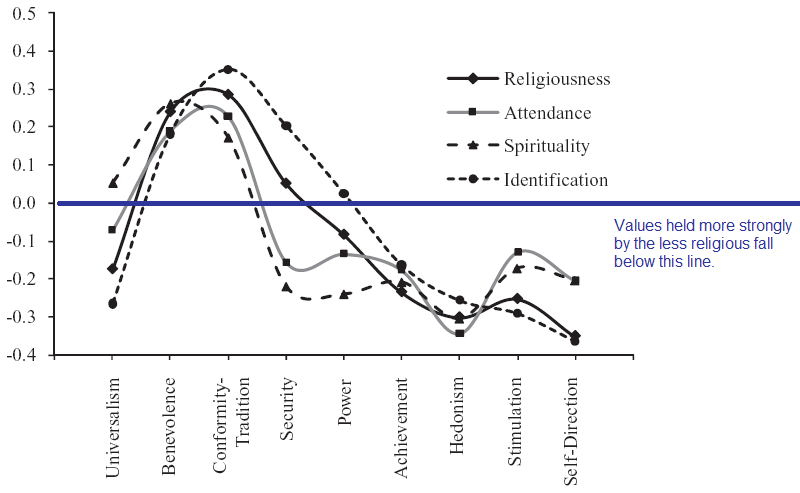Most research on religion is done in the US, a country which is something of an outlier among modernised nations because of the importance of religion in daily life. So, for example, the non-religious in the US tend to be ‘disagreeable’ (meaning that they are nonconformist and prefer to go their own way). But is this something general about the non-religious, or does it simply tell us something about what it takes to be openly non-religious in the USA?
So a recent analysis of the values of the religious and the non-religious in the UK is particularly interesting. The UK is moderately godless – few people go to Church, and a substantial minority (30-40%) don’t believe in God.
The researchers sent surveys to 2,000 people in two towns in the south east of England (Woking and Guildford, to be precise) and got 260 back. So it’s not exactly a random sample! They asked people about their values, using a standard scale (the Schwartz Value Scale) which splits values into nine broad categories.
You can see their main findings in the figure. Basically, the peaks relate to values that are endorsed more strongly by the religious. The troughs relate to values that are endorsed more strongly by the non-religious.
 These are the values held dear by the non-religious in the UK:
These are the values held dear by the non-religious in the UK:
- Universalism: Understanding, appreciation, tolerance, and protection for the welfare of all people and for nature.
- Achievement: Personal success through demonstrating competence according to social standards.
- Hedonism: Pleasure and sensual gratification for oneself.
- Stimulation: Excitement, novelty and challenge in life.
- Self-direction: Independent thought and action – choosing, creating, exploring.
By contrast, these values are held dear by the religious:
- Benevolence: Preservation and enhancement of the welfare of people with whom one is in frequent personal contact.
- Conformity-tradition: Restraint of actions likely to upset or harm others or violate social norms. Respect, commitment, and acceptance of the customs and ideas that traditional culture or religion provide.
And there are two values for which the relationship changes according to how religion is defined – higher for ‘religiousness’ and ‘attendance’ than for ‘spirituality’ or ‘identification’. These are:
- Security: Safety, harmony, and stability of society, or relationships, and of self.
- Power: Social status and prestige, control or dominance over people and resources.
All in all, I don’t think there are any major surprises. The religious are relatively more focused on their immediate friends, as well as respect for tradition and conformity. The non-religious, in contrast, tend to be those with the widest horizons and the most independent, confident spirits!
![]() Pepper, M., Jackson, T., & Uzzell, D. (2010). A Study of Multidimensional Religion Constructs and Values in the United Kingdom Journal for the Scientific Study of Religion, 49 (1), 127-146 DOI: 10.1111/j.1468-5906.2009.01496.x
Pepper, M., Jackson, T., & Uzzell, D. (2010). A Study of Multidimensional Religion Constructs and Values in the United Kingdom Journal for the Scientific Study of Religion, 49 (1), 127-146 DOI: 10.1111/j.1468-5906.2009.01496.x
 This article by Tom Rees was first published on Epiphenom. It is licensed under Creative Commons.
This article by Tom Rees was first published on Epiphenom. It is licensed under Creative Commons.













